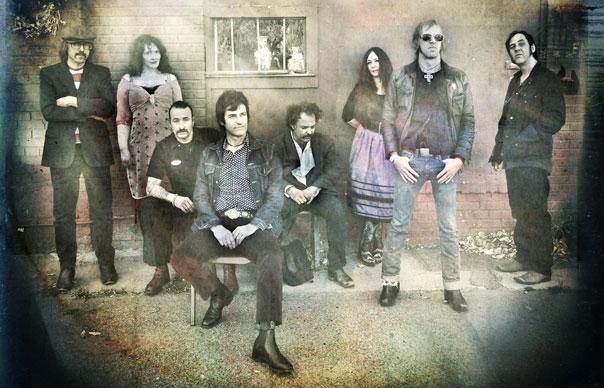First new material in 20 years from celebrated post-punk doomsayers... Perhaps the most enduring document of Crime & The City Solution is to be found in Wim Wenders’ 1987 film Wings Of Desire. A sombre fantasy in which angels watch over the traumatised inhabitants of West Berlin, it climaxes with a scene in which the group – fronted by snakish vocalist Simon Bonney, his sideman the exceptional guitarist Rowland S Howard – perform their “Six Bells Chime” with a holy intensity. Formed in Sydney in 1976, Crime emerged from the same post-punk flux that also spawned The Birthday Party. But never did they seem as at home as they did in Berlin, their apocalyptic punk-blues an eerily perfect fit for this city of decadence and division. The third, Berlin-based incarnation of Crime And The City Solution disintegrated in 1991, a year after fourth album Paradise Discotheque. Bonney moved to Los Angeles, released two solo albums that indicated a growing interest in blues and country, and then… nothing. Nothing until 2011, when a new line-up of Crime & The City Solution sprung from the ashes. Now operating out of Detroit, this incarnation brings together old hands such as violinist Bronwyn Adams with new, if familiar faces: the likes of drummer Jim White, also of The Dirty Three, and David Eugene Edwards, formerly of 16 Horsepower. What is initially startling about American Twilight is how easily they whip up some of the old fire and brimstone. There is hurricane-force rock’n’roll (“Goddess”), apocalyptic Mariachi (“My Love Takes Me There”), Dionysian funk-rock (“Riven Man”). The gothic gospel of “Domina” is a reminder of Bonney’s exceptional, abject lyricism. “Billowing sails… incision of your nails… wheals on the skin…” he spouts, a preacher atop a decaying pulpit. As the title suggests, this is a very American record. Perhaps as Berlin felt in the mid-‘80s, Detroit feels now: a city of division, albeit one whose wounds have been inflicted by capitalism, not war. American Twilight is seldom better than its title track, searing swamp-punk that recalls Grinderman in its sense of diabolic abandon. Elegy for a civilisation in decay, live it’s accompanied by a slideshow of modern Detroit, buildings fallen into dereliction. Not a band tied to any one place, then. But expert at locating something holy in the rubble. Louis Pattison
First new material in 20 years from celebrated post-punk doomsayers…
Perhaps the most enduring document of Crime & The City Solution is to be found in Wim Wenders’ 1987 film Wings Of Desire. A sombre fantasy in which angels watch over the traumatised inhabitants of West Berlin, it climaxes with a scene in which the group – fronted by snakish vocalist Simon Bonney, his sideman the exceptional guitarist Rowland S Howard – perform their “Six Bells Chime” with a holy intensity. Formed in Sydney in 1976, Crime emerged from the same post-punk flux that also spawned The Birthday Party. But never did they seem as at home as they did in Berlin, their apocalyptic punk-blues an eerily perfect fit for this city of decadence and division.
The third, Berlin-based incarnation of Crime And The City Solution disintegrated in 1991, a year after fourth album Paradise Discotheque. Bonney moved to Los Angeles, released two solo albums that indicated a growing interest in blues and country, and then… nothing. Nothing until 2011, when a new line-up of Crime & The City Solution sprung from the ashes. Now operating out of Detroit, this incarnation brings together old hands such as violinist Bronwyn Adams with new, if familiar faces: the likes of drummer Jim White, also of The Dirty Three, and David Eugene Edwards, formerly of 16 Horsepower.
What is initially startling about American Twilight is how easily they whip up some of the old fire and brimstone. There is hurricane-force rock’n’roll (“Goddess”), apocalyptic Mariachi (“My Love Takes Me There”), Dionysian funk-rock (“Riven Man”). The gothic gospel of “Domina” is a reminder of Bonney’s exceptional, abject lyricism. “Billowing sails… incision of your nails… wheals on the skin…” he spouts, a preacher atop a decaying pulpit.
As the title suggests, this is a very American record. Perhaps as Berlin felt in the mid-‘80s, Detroit feels now: a city of division, albeit one whose wounds have been inflicted by capitalism, not war. American Twilight is seldom better than its title track, searing swamp-punk that recalls Grinderman in its sense of diabolic abandon. Elegy for a civilisation in decay, live it’s accompanied by a slideshow of modern Detroit, buildings fallen into dereliction. Not a band tied to any one place, then. But expert at locating something holy in the rubble.
Louis Pattison



